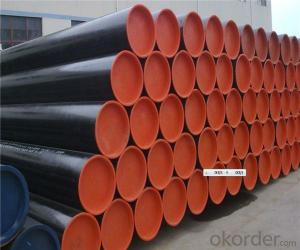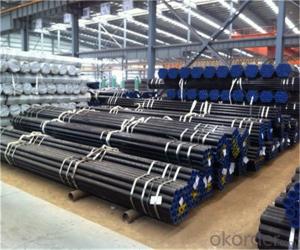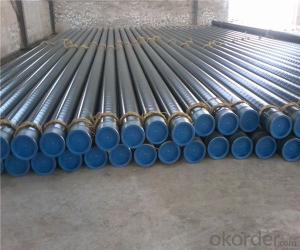Galvanized Welded Pipe from CNBM International Corporation
- Loading Port:
- Tianjin
- Payment Terms:
- TT OR LC
- Min Order Qty:
- 25 m.t.
- Supply Capability:
- 1000000 m.t./month
OKorder Service Pledge
OKorder Financial Service
You Might Also Like
1、Structure of Galvanized Welded Pipe:
Seamless pipe is formed by drawing a solid billet over a piercing rod to create the hollow shell. As the manufacturing process does not include any welding, seamless pipes are perceived to be stronger and more reliable. Historically seamless pipe was regarded as withstanding pressure better than other types, and was often more easily available than welded pipe.
2、Main Features of Galvanized Welded Pipe:
• High manufacturing accuracy
• High strength
• Small inertia resistance
• Strong heat dissipation ability
• Good visual effect
• Reasonable price
3、Galvanized Welded Pipe Specification:
Standard | GB, DIN, ASTM ASTM A106-2006, ASTM A53-2007 |
Grade | 10#-45#, 16Mn 10#, 20#, 45#, 16Mn |
Thickness | 8 - 33 mm |
Section Shape | Round |
Outer Diameter | 133 - 219 mm |
Place of Origin | Shandong, China (Mainland) |
Secondary Or Not | Non-secondary |
Application | Hydraulic Pipe |
Technique | Cold Drawn |
Certification | API |
Surface Treatment | factory state or painted black |
Special Pipe | API Pipe |
Alloy Or Not | Non-alloy |
Length | 5-12M |
Outer Diameter | 21.3-610mm |
Grade | 20#, 45#, Q345, API J55, API K55, API L80, API N80, API P110, A53B |
Standard | ASME, ASTM |
1) Material:20#(ASTM A 106/A53 GRB.API5LGRB,GB),45#,16Mn,10#.
2) Specification range:OD:21.3-610mm,WT:6-70mm,length:6-12m or according to the requirement of clients.
3) Excutive standards:GB,ASME API5L.ASTM A 106/A53,Despite of the above standards,we can also supply seamless steel pipe with standard of DIN,JIS,and so on,and also develop new products according to the requirements of our clients!
4) Surface:black lacquered,varnish coating or galvanized.
5) Ends:Beveled or square cut,plastic capped,painted.
6) Packing:bundles wrapped with strong steel strip,seaworthy packing.
4、Packaging & Delivery
Packaging Details: | seaworthy package,bundles wrapped with strong steel strip |
Delivery Detail: | 15-30days after received 30%TT |
5、FAQ of Galvanized Welded Pipe:
①How is the quality of your products?
Our products are manufactured strictly according to national and internaional standard, and we take a test
on every pipe before delivered out. If you want see our quality certifications and all kinds of testing report, please just ask us for it.
Guaranteed: If products’ quality don’t accord to discription as we give or the promise before you place order, we promise 100% refund.
②How about price?
Yes, we are factory and be able to give you lowest price below market one, and we have a policy that “ for saving time and absolutely honest business attitude, we quote as lowest as possible for any customer, and discount can be given according to quantity”,if you like bargain and factory price is not low enough as you think, just don’t waste your time.Please trust the quotation we would give you, it is professional one.
③Why should you chose us?
Chose happens because of quality, then price, We can give you both.Additionally, we can also offer professional products inquiry, products knowledge train(for agents), smooth goods delivery, exellent customer solution proposals.Our service formula: good quality+good price+good service=customer’s trust
SGS test is available, customer inspection before shipping is welcome, third party inspection is no problem.
6、Galvanized Welded Pipe Images:
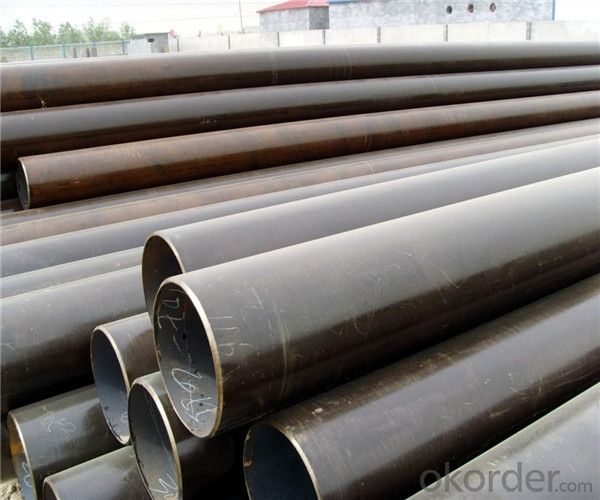
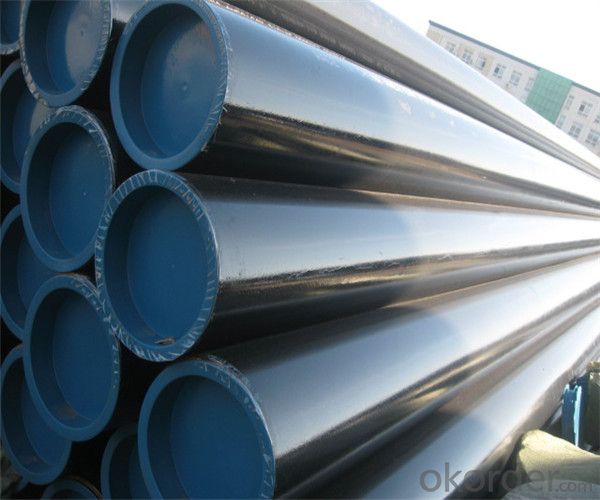
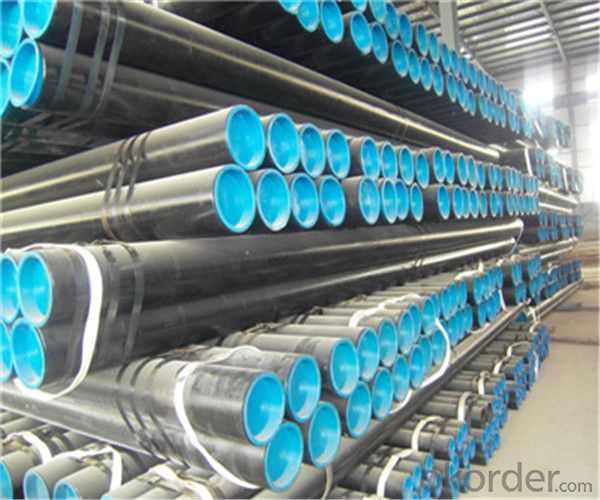
- Q:Can steel pipes be used for heat exchangers?
- Yes, steel pipes can be used for heat exchangers. Steel pipes are commonly used in heat exchangers due to their strength, durability, and excellent thermal conductivity properties. They are capable of withstanding high temperatures and pressures, making them suitable for various industrial applications.
- Q:What is the difference between steel pipes and PEX pipes?
- Steel pipes are made from steel, a durable and strong material, while PEX pipes are made from cross-linked polyethylene, a flexible and lightweight material. Steel pipes are typically used for high-pressure applications, such as plumbing systems in commercial buildings, while PEX pipes are commonly used in residential plumbing due to their ease of installation, resistance to freezing and bursting, and lower cost. Additionally, steel pipes require threading and soldering for connections, while PEX pipes use push-fit or crimp fittings, making them easier to work with.
- Q:Material of welded steel pipe
- GB/T14980-1994 (large diameter welded pipe for low pressure fluid delivery). Mainly used to transport water, sewage, gas, air, heating, steam and other low-pressure fluid and other uses. Its representative material is Q235 grade a steel.GB/T12770-1991 (stainless steel welded pipe for mechanical structure). Mainly used in machinery, automobiles, bicycles, furniture, hotels and restaurants, decorations and other mechanical parts and structures. Its representative material 0Cr13, 1Cr17, 00Cr19Ni11, 1Cr18Ni9, 0Cr18Ni11Nb and so on.
- Q:How are steel pipes used in the manufacturing of appliances?
- Steel pipes are commonly used in the manufacturing of appliances for various purposes such as transporting fluids, gases, and air within the appliance, providing structural support, and acting as conduits for electrical wiring. They are also used for creating ventilation systems and heat transfer mechanisms, ensuring efficient operation and durability of appliances.
- Q:Are steel pipes suitable for structural applications?
- Yes, steel pipes are suitable for structural applications. Steel pipes are known for their strength, durability, and versatility, making them ideal for various structural applications. They can be used in buildings, bridges, stadiums, and other structures to provide support and stability. Steel pipes have high tensile strength, which allows them to withstand heavy loads and resist deformation under pressure. Additionally, their resistance to corrosion makes them a reliable choice for structural applications, even in harsh environments. The use of steel pipes in structural applications is further enhanced by their cost-effectiveness and easy installation. Overall, steel pipes are a popular choice in the construction industry due to their strength, durability, versatility, and cost-effectiveness.
- Q:What is the minimum wall thickness for steel pipes?
- The minimum wall thickness for steel pipes depends on various factors such as the pipe size, pressure rating, and intended use. However, as a general guideline, the minimum wall thickness for steel pipes is typically determined by industry standards and regulations, and it can range from a few millimeters to several inches. It is important to consult specific codes and standards relevant to the application to accurately determine the required minimum wall thickness for steel pipes.
- Q:How do you cut steel pipes?
- Steel pipes can be cut using various methods, such as using a hacksaw, a reciprocating saw with a metal-cutting blade, or a pipe cutter specifically designed for steel pipes. Additionally, plasma cutting or oxy-fuel cutting can be used for thicker pipes. The choice of cutting method depends on the pipe diameter, thickness, and the available tools or equipment.
- Q:What is the difference between steel pipe and ductile iron pipe?
- Steel pipe and ductile iron pipe are both commonly used in various industries for transporting fluids and gases. However, there are some key differences between the two materials. One of the main differences is their composition. Steel pipe is made primarily of iron and carbon, with other alloying elements added to enhance its strength and corrosion resistance. On the other hand, ductile iron pipe is a form of cast iron that has been treated to improve its ductility and toughness. It contains higher amounts of carbon and silicon, along with small amounts of other elements such as magnesium and copper. Another difference is their strength and durability. Steel pipe is known for its high strength and can withstand higher pressures and stresses compared to ductile iron pipe. It is also more resistant to impact and bending, making it suitable for applications where high strength is required. Ductile iron pipe, although not as strong as steel, still offers good strength and durability, especially in applications where there is a risk of external damage or heavy loads. Corrosion resistance is another factor to consider. Steel pipe is typically more resistant to corrosion due to the addition of alloying elements such as chromium and nickel. This makes it suitable for applications where there is a high risk of corrosion, such as pipelines carrying corrosive fluids. Ductile iron pipe, while also having some corrosion resistance, may require additional protective coatings to enhance its durability in corrosive environments. Installation and maintenance are also different for these two types of pipes. Steel pipe is generally lighter and easier to handle, making it easier to install. It can also be welded, which allows for more flexibility in the construction process. Ductile iron pipe, being a cast iron material, requires more specialized installation techniques, such as using mechanical joints or flanges. It is also more prone to cracking during installation if not handled properly. In terms of cost, steel pipe is generally more expensive than ductile iron pipe. This is due to the higher cost of raw materials and the additional processing required to produce steel pipe. However, it is important to consider the overall lifecycle cost, as steel pipe's higher strength and corrosion resistance may result in lower maintenance and replacement costs in the long run. In summary, while both steel pipe and ductile iron pipe have their own advantages and applications, the choice between the two depends on factors such as strength requirements, corrosion resistance, installation methods, and budget considerations. Careful consideration of these factors will help determine which pipe material is most suitable for a specific application.
- Q:What are the different sizes of threads available for steel pipes?
- The different sizes of threads available for steel pipes vary depending on the specific requirements and standards. Common thread sizes for steel pipes include 1/8", 1/4", 3/8", 1/2", 3/4", 1", 1-1/4", 1-1/2", 2", 2-1/2", 3", 3-1/2", 4", 5", 6", 8", 10", and 12". However, these sizes may vary based on the specific industry, country, and application.
- Q:When can I use the PVC pipe and when to use the galvanized pipe?
- PVC pipeline use temperature is -5 to 90 degrees or so, according to the current market price of around 6000 yuan per ton, the price is cheap. Its corrosion resistance is good, can resist most of the acid and alkali, and unlike the steel pipe that is easy to rust, so in the construction of the upper and lower water pipes and other fields have gradually replaced the trend of steel pipe.
1. Manufacturer Overview |
|
|---|---|
| Location | |
| Year Established | |
| Annual Output Value | |
| Main Markets | |
| Company Certifications | |
2. Manufacturer Certificates |
|
|---|---|
| a) Certification Name | |
| Range | |
| Reference | |
| Validity Period | |
3. Manufacturer Capability |
|
|---|---|
| a)Trade Capacity | |
| Nearest Port | |
| Export Percentage | |
| No.of Employees in Trade Department | |
| Language Spoken: | |
| b)Factory Information | |
| Factory Size: | |
| No. of Production Lines | |
| Contract Manufacturing | |
| Product Price Range | |
Send your message to us
Galvanized Welded Pipe from CNBM International Corporation
- Loading Port:
- Tianjin
- Payment Terms:
- TT OR LC
- Min Order Qty:
- 25 m.t.
- Supply Capability:
- 1000000 m.t./month
OKorder Service Pledge
OKorder Financial Service
Similar products
New products
Hot products
Related keywords
